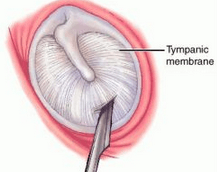Myringotomy Post Surgery Care
As soon as the surgery is over, the patient is taken to the recovery room. It takes almost an hour for the patient to completely come out of the anesthetic state. On getting back to normalcy, he/she is discharged home on the same day after giving some advices.
Some patients may become hungry immediately after surgery, but it is advised not to eat instantly as it might induce vomiting due to the reaction with the anesthesia. However, it is completely normal for the patient to vomit once or twice post surgery. In case the patient continues to vomit for quite some time, then the doctor may prescribe some medication to stop it.
Follow-up Care
After about 10-14 days of the surgery a follow up ear check up is recommended in order to check the position and functioning of the ear tubes.
 Cortisporin ear drop is usually given to use immediately after the surgery for 3 or 4 days. If the ears continue to drain after that, the ear drops can be continued as per the prescription of the doctor. In case the use of this medication causes severe ear aches or skin rash, it is advisable to discontinue it. It could be substituted with sulfacetamide/prednisolone drops, which is usually used if water accidentally enters the ear, to prevent water contamination. However, it should be kept in mind that before taking this medicine it should be warmed by holding it in the hand for about 5 minutes. It can then be pumped into the ear by pushing the ‘tragus,’ that is, the cartilage tissue located in front of the ear canal.
Cortisporin ear drop is usually given to use immediately after the surgery for 3 or 4 days. If the ears continue to drain after that, the ear drops can be continued as per the prescription of the doctor. In case the use of this medication causes severe ear aches or skin rash, it is advisable to discontinue it. It could be substituted with sulfacetamide/prednisolone drops, which is usually used if water accidentally enters the ear, to prevent water contamination. However, it should be kept in mind that before taking this medicine it should be warmed by holding it in the hand for about 5 minutes. It can then be pumped into the ear by pushing the ‘tragus,’ that is, the cartilage tissue located in front of the ear canal.
During the healing period the patient may feel uneasy due to the bloody discharge or discharge of a clear yellowish liquid from the ear, which is quite normal after the surgery. In such cases, cotton may be placed in the ear canal and changed from time to time in order to keep the area dry. If, however, during the immediate post operative period, a continuous drainage of foul smelling fluid is witnessed, the doctor should be consulted.
The doctor usually orders for an audiogram, after the ear has completely healed.
A minor debate as to the protection of the ear, post surgery, against water is prevalent. While conventionally it is believed that the ear should be well protected against water from entering the ear canal, some otolaryngologists believe there is no such need. Conventional medical advice says that since now there is a passage in the middle ear because of the tubes, water might enter there as well, which in turn will cause infection or ear drainage. As opposed to the chlorinated water of the swimming pools, pond or lake water has greater risks of infection. Doctor’s advice is to be taken in such cases.